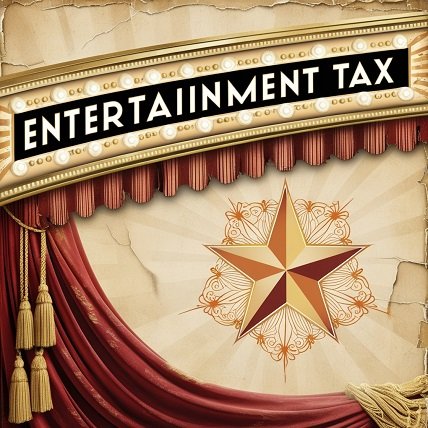Introduction
The term entertainment tax, which frequently confounds people, refers to a charge levied on many types of recreational and entertainment activities. The entertainment tax has become a substantial source of income for governments worldwide as they search for new and creative methods to increase tax revenue. But depending on the jurisdiction, the effects of this tax might be complicated and differ greatly. We’ll go over the specifics of the entertainment tax in this extensive guide, including its goals, how it operates, how it affects various stakeholders, and the relevant legal and practical issues.
The Entertainment Tax: What Is It?
Governments apply entertainment tax, which are specific levies on a variety of leisure and recreational activities, such as movie tickets, concert tickets, theatre tickets, admission to amusement parks, and sports events. Usually collected as a percentage of the ticket price or as a fixed fee added to the admission price, this tax is collected at the point of sale.
The Entertainment Tax’s Objective
The entertainment tax’s primary goal is to give governments an extra source of income, which is important for paying for public services like healthcare, infrastructure, and education. This tax frequently contributes to community-beneficial cultural and recreational initiatives, like upkeep of public parks and financing of regional arts initiatives. Furthermore, in certain jurisdictions.
The Application of Entertainment Tax
Various methods of implementing an entertainment tax can be employed, contingent upon local laws and the characteristics of the entertainment sector. The most popular approach entails immediately attaching a predetermined amount or percentage tax to ticket sales, which is subsequently collected from customers. Entertainment establishments may be required by some jurisdictions to pay licensing costs that incorporate an entertainment tax component. In addition, the duty of gathering and sending in this tax may fall to the event planners.
Rates of Entertainment Taxation Worldwide
The global distribution of entertainment tax rates is a reflection of varied political and economic environments. Entertainment taxes are frequently levied at the state or local level in the US, and depending on the location, they can range from 1% to over 10% of the cost of a ticket. In contrast, tickets for theatre and concerts are subject to a 20% Value Added Tax (VAT) in the United Kingdom. With state-specific entertainment tax rates that can go as high as 30%, India offers a unique situation.
The Entertainment Tax’s Effect on Consumers
The entertainment tax immediately affects customers by raising the price of tickets and other entertainment-related charges. Consumer behaviour may be impacted by this price increase, maybe prompting people to spend less on amusement or look for more economical alternatives. Higher taxes may have the unintended consequence of denying lower-class people and families access to cultural and recreational options, which lowers their standard of living and reduces their leisure time.
The Entertainment Tax’s Effect on Enterprises
The entertainment tax has various effects on businesses in the entertainment sector. First of all, because they have to oversee and send in the revenue that is collected from customers, the tax raises their operating expenses. Businesses may increase ticket prices to offset the cost, but this could have an impact on total sales and profitability. Businesses also need to invest in compliance procedures, which may be expensive administratively. These measures include systems for correct tax reporting and payment.
Legal Aspects and Adherence
There are a number of legal considerations and compliance requirements when navigating the entertainment tax legislation. To ensure they follow local laws, businesses are frequently required to register with tax authorities in order to collect and submit the tax. Maintaining accurate records is essential for monitoring transactions and meeting reporting requirements. To stay in compliance, you must file and pay taxes on a regular basis; otherwise, you risk penalties and fines.
Conclusion
The revenue generated by the entertainment tax is essential for governments to maintain public services. It can, however, have a big effect on customers and companies, affecting things like ticket prices, entertainment accessibility, and operating expenses. The structure and implementation of the entertainment tax may alter as the entertainment industry changes, especially with the emergence of digital platforms.
FAQ
Which forms of entertainment are liable to the tax on entertainment?
A variety of events and activities are subject to entertainment taxation, including as sporting events, movies, concerts, plays, amusement parks, and occasionally even streaming services on the internet.
How is the tax on entertainment computed?
Typically, entertainment tax is computed as a flat amount per ticket or as a percentage of the ticket price. It might occasionally also apply to venue licensing costs or other income received from entertainment events. Read about more: investment opportunities
Who bears the cost of the entertainment tax?
At the moment of sale, the customer is usually responsible for paying the amusement tax. On the other hand, enterprises and event planners are in charge of gathering the tax and sending it to the appropriate authorities.

